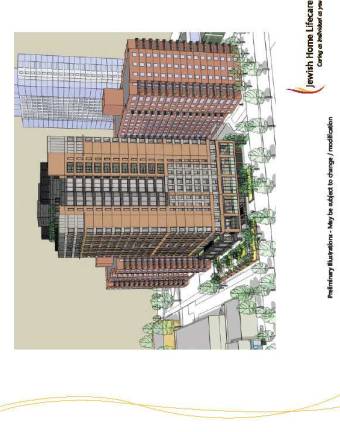A Nursing-Home Fight on the Upper West Side

Residents raise noise, dust concerns about new facility
Could a nursing home endanger the Upper West Side?
The Department of Health held a public scoping meeting to discuss environmental concerns regarding Jewish Home Lifecare's proposed nursing home on West 97th Street last Tuesday, drawing a spirited debate from residents and elected officials about concerns regarding the assisted living center. And although the conversation was open for both sides, the voices of dissent spoke louder and more often about what they see as an unwanted development on the ever-developing Upper West Side.
Much of the rhetoric about the property related to P.S. 163 at 163 West 97th Street, adjacent to where the building is slated for construction.
"This is our daughter's only zoned public school," Amy Brandon, a parent from the neighborhood, said. "One in ten school age children have asthma, including my daughter. Will you pay her medical bills, if she gets sick?"
Concerns about health ? and other adverse health affects ? largely relate to the construction of the Jewish Home Lifecare building, when residents worry that noise and dust could negatively impact the schoolchildren adjacent to the work that will be done.
Other residents are concerned that the building will be built over a parking lot that is too contaminated with hazardous materials to handle safely.
Martin Rosenblatt, a resident of the neighborhood, took soil samples of the area this spring, and found that lead levels in the land exceeded the Environmental Protection Agency's limit for areas in which children are allowed to play. Further research ? including a historical check of toxic spills in the area, commissioned to the organization Toxics Targeting ? has Rosenblatt convinced that the risk involved is too high.
"Unless it rains daily for the entire length of construction, which is expected to last several years, a toxic cloud will permeate the neighborhood."
Other residents worry that increased traffic and a loss of light and open space are too high of a price to pay.
Ethan Geto, spokesperson for the nursing home, notes that JHL is installing a driveway to help mitigate traffic concerns, though he concedes that there will be some new traffic. However, he is adamant that health-concerns relating to contaminants is unfounded.
"Lead is pervasive in the soil everywhere in New York City, but the bottom line is, there's strict protocol for how soil is handled during construction," Geto said. "No one is going to be harmed."
"We do a bad enough job just trying to see if the workers themselves are getting sick or hurt on the job, and we do an even worse job with the community," said Rick Nietzel, an assistant professor at the University for Michigan School for Public Health who specializes in the effects of human exposure to construction. "That's true for all contaminants, be they lead, noise, or dust in the air."
Still, Nietzel also rejects Rosenblatt's claim that high levels of hazardous chemicals in the ground automatically disqualifies the site for construction. "If there are contaminants in the soil, there'll be a limited period when that soil is disrupted? but there are ways to do that work safely to prevent those materials from getting off the site."